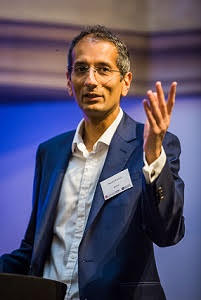Keynotes
Awais Rashid
 Equitable Privacy: Understanding Privacy Requirements of Marginalised and Vulnerable Populations. Digital technologies are becoming pervasive in society, from online shopping and social interactions through to finance, banking and transportation. With a future vision of smart cities, driven by a real-time, data-driven, digital economy, privacy is paramount. It is critical to engendering trust in the digital fabric on which society relies and is enshrined as a fundamental human right in the Universal Declation of Human Rights and regulations such as GDPR. Significant efforts have been made to provide users with more agency in understanding, controlling and assuring the way their data and information is processed and shared.
Equitable Privacy: Understanding Privacy Requirements of Marginalised and Vulnerable Populations. Digital technologies are becoming pervasive in society, from online shopping and social interactions through to finance, banking and transportation. With a future vision of smart cities, driven by a real-time, data-driven, digital economy, privacy is paramount. It is critical to engendering trust in the digital fabric on which society relies and is enshrined as a fundamental human right in the Universal Declation of Human Rights and regulations such as GDPR. Significant efforts have been made to provide users with more agency in understanding, controlling and assuring the way their data and information is processed and shared.
However, this ability to control, understand and assure is not equitably experienced across society. For instance, individuals from lower-income groups often have to share devices to access services that may include sensitive information. In case of victims of intimate partner violence, an innocuous app (such as find my phone) or digital device (such as a smart doorbell) may be used to monitor their activities and there are significant risks of using online reporting tools for fear of traceability. Such vulnerable and marginalised populations have nuanced privacy and information control needs as well as threat models. These needs and requirements are not typically foregrounded to software developers. The challenge is compounded by the fact that developers are neither privacy experts nor typically have the training, tools, support and guidance to design for the diverse privacy needs of marginalised and vulnerable groups.
In this talk, I will discuss insights from an ongoing multi-year programme of research on understanding the privacy requirements of such populations and highlight a research agenda for the software engineering community to develop resources to systematically address them.
Awais Rashid is Professor of Cyber Security at the University of Bristol. His research spans cyber security and software engineering, with a particular focus on cyber-physical systems security, software security and usable security and privacy. He is Director of the UK’s National Research Centre on Privacy, Harm Reduction and Adversarial Influence Online (REPHRAIN) and Director of the EPSRC Centre for Doctoral Training in Trust, Identity, Privacy and Security in Large-Scale Infrastructures. He is also the lead and editor-in-chief of CyBOK, the Cyber Security Body of Knowledge. He also leads research on readiness of software engineers and developers to work with new secure hardware as part of the Digital Security by Design programme. He also previously led projects as part of the UK Research Institute on Trustworthy Industrial Control Systems (RITICS), the UK Research Institute on Socio-technical Cyber Security (RISCS) and the National Centre of Excellence on Cyber Security of Internet of Things (PETRAS). He was also a Fellow of the Alan Turing Institute (2018-2021).
Lorenz Hilty
Sustainable Software or Sustainable Business Models. There are various approaches to sustainable software, i.e. to the application of sustainability criteria to software artifacts and software engineering, including requirements engineering. In my talk, I will give a critical (and partly self-critical) overview of some of these approaches to “green software” or “sustainable software” from the perspective of sustainable development strategies. My main argument is that the impact of software on our efforts to keep this planet in a habitable state for humans depends much more on the business models for which the software is used than on the characteristics of the software or the software development process. In particular, I will look at efficiency, consistency and sufficiency strategies of sustainable development as well as pipeline, circular and platform business models.
 Lorenz M. Hilty is Professor of Informatics and Sustainability at the University of Zurich (UZH), Sustainability Delegate of UZH, and Director of the Zurich Knowledge Center for Sustainable Development. He serves as a member of the Steering Committee of TA-Swiss, the Foundation for Technology Assessment of the Swiss Academies of Arts and Sciences. In his research, he examines the opportunities and risks of digitalization for sustainable development.
Lorenz M. Hilty is Professor of Informatics and Sustainability at the University of Zurich (UZH), Sustainability Delegate of UZH, and Director of the Zurich Knowledge Center for Sustainable Development. He serves as a member of the Steering Committee of TA-Swiss, the Foundation for Technology Assessment of the Swiss Academies of Arts and Sciences. In his research, he examines the opportunities and risks of digitalization for sustainable development.
Lorenz holds a PhD and habilitation in computer science from the University of Hamburg. Before being appointed professor at UZH in 2010, he was head of the Technology and Society Lab at Empa, the Swiss Federal Laboratories for Materials Testing and Research, and affiliated professor at KTH Royal Institute of Technology in Stockholm. In 2013, he initiated the ICT4S (Information and Communication Technologies for Sustainability) conference series with ICT4S 2013 in Zurich. He authored or co-authored more than 150 articles and books about sustainability aspects of digital technology.
Irina Koitz
 Unlock revenue by understanding your users: industry practices and pitfalls revealed. In today’s world defined by user-centric products and services, the key to unlocking revenue lies in a profound understanding of users. This keynote delves into practices from across multiple industries and unveils potential pitfalls. We will demonstrate with real-world examples how proven approaches such as traditional requirements practices, design thinking, user feedback, and methodologies such as agile, kanban and SAFe can be applied successfully in practice to deeply understand and predict user needs, build products that delight users, and ultimately increase ROI. We will uncover actionable strategies that align with contemporary industry trends, such as leveraging data analytics and AI, both when users are accessible and when they are simply unidentifiable. However, this journey is fraught with challenges. In this talk, we will address common pitfalls and misconceptions that organizations encounter in their pursuit of user-centricity. Drawing from lessons learned, we will navigate the complexities of balancing user satisfaction with corporate strategies and established business models, generalizing best practices and fitting theoretical methods to industrial settings. Industry practitioners looking for insights and strategies to monetize user insights, and researchers defining tomorrow’s agenda for RE methods, join me in unlocking revenue by understanding your users.
Unlock revenue by understanding your users: industry practices and pitfalls revealed. In today’s world defined by user-centric products and services, the key to unlocking revenue lies in a profound understanding of users. This keynote delves into practices from across multiple industries and unveils potential pitfalls. We will demonstrate with real-world examples how proven approaches such as traditional requirements practices, design thinking, user feedback, and methodologies such as agile, kanban and SAFe can be applied successfully in practice to deeply understand and predict user needs, build products that delight users, and ultimately increase ROI. We will uncover actionable strategies that align with contemporary industry trends, such as leveraging data analytics and AI, both when users are accessible and when they are simply unidentifiable. However, this journey is fraught with challenges. In this talk, we will address common pitfalls and misconceptions that organizations encounter in their pursuit of user-centricity. Drawing from lessons learned, we will navigate the complexities of balancing user satisfaction with corporate strategies and established business models, generalizing best practices and fitting theoretical methods to industrial settings. Industry practitioners looking for insights and strategies to monetize user insights, and researchers defining tomorrow’s agenda for RE methods, join me in unlocking revenue by understanding your users.
Irina Koitz is a computer scientist and digital product innovator, experienced in hands-on data analytics and strategy, AI, product management, requirements engineering and software development. She holds a PhD in computer science with a focus on requirements engineering from University of Zurich, complemented by an executive business program from Harvard. Her professional experience spans across multiple industries from high-tech and telecom in her early career (Microsoft and Nokia Siemens Networks) to engineering (Siemens), pharma and consumer health (Johnson & Johnson / Kenvue). Having started as a software engineer, she aspired to strategically drive products at scale and, after her graduate studies, joined Siemens as a Global Product Manager for data-driven cloud offerings for smart buildings. Then, she continued her journey in the data domain with roles such as Head of Data Analytics and Director Data Strategy for Siemens Smart Infrastructure. She is currently Director Product Data at Kenvue, building data as a product across the entire organization. Throughout her academic and industry career, she has always been driven to engage and profoundly understand end-users, convinced that this is the only way to deliver successful products and ultimately business success.